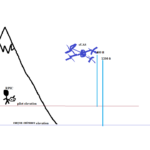With the advancement and rise of the drone in recent years, concerns of the ethics and privacies of the miniature fliers are coming to the forefront of the public mind. The government is using drones to observe and gather intelligence on terrorists in the Middle East. What is to say that the government can’t and won’t do the same with its civilians? It is an understandable concern. Some police forces across the country are already employing drones for surveillance and reconnaissance, and it’s only a matter of time before they become a staple of law enforcement. There are three main ways to look at the emergence of drones and privacy: drones are the end of any semblance of privacy, drones will be a catalyst for new privacy laws, or that drones will change the way we think of privacy.
The first of these three possibilities is what people are most concerned of drones becoming: the all-seeing eye in the sky, recording and monitoring all. Drones have an undeniable allure when it comes to surveillance; they can reach vantage points your stakeout officer can’t, they can stay there longer, and have a more accurate memory. If a drone is always up in the air, in the area, police will always have an accurate record of what happened in a particular place at a given time. Yet, law-abiding citizens shouldn’t have to worry about always being watched. It’s claimed it’s a breach to their privacy, which is in itself a maze of legalities and various laws and ordinances depending on the model of the drone, who’s operating it, and where. The lack of clearly stated rules and regulations for drones and their surveillance only contributes to the public fear of them. The fear of drones and just what the government will do with them is so great that Rand Paul even staged a thirteen-hour filibuster in the senate last year about drones .
Of course, while some view drones as something close to the devil-incarnate, others see drones as an opportunity. Ryan Calo, a research director at Stanford University at the time, published an article in 2011 wondering if drones might be the push that’s needed to finally update privacy law into the twenty-first century. According to Calo, the last major revision to privacy law in the United States was in 1986, an era before handheld electronics or even the Internet, two tools used extensively for surveillance today. The ubiquity of the Internet and the smartphones we use to access it allow us to be tracked, wiretapped, profiled and more, making surveillance that much easier. Privacy law has not kept up, and is not made to deal with twenty-first century tools. Drones, however, being far more visible and present than the Internet, can, and are, creating a widespread concern about privacy. People are clamoring for new laws, new restrictions to protect their privacy. Such an outcry arguably would not exist without the emergence of drones.
These new privacy laws that people are calling for may not be enacted in exactly the way they expect, however. Ideally, the new laws would restrict drones, so that people may continue on about their daily lives as they always have. Caren Morrison of the Georgia State University College of Law sees an alternate future, however, where the very definition of privacy has been redefined to create a more egalitarian society. In her 2013 paper, Dr. Panopticon, Or, How I Learned To Stop Worrying And Love The Drone, Morrison argues that drones can eliminate an inherent racism and discrimination present in modern surveillance. Certain groups, such as Muslims and Latinos are already targets for surveillance, as they may be terrorists or illegal immigrants, respectively. These two groups do not have a right to privacy; the government has collected intelligence on them simply because of their origin, something they cannot control or determine. A network of drones, always surveying, always watching, can eliminate this bias by gathering intelligence on everyone. While it is concerning to consider the sheer volume of data that the government would have on any one person in such a system, Morrison proposes a change to the law that, rather than require a warrant to gather intelligence and conduct searches, a warrant is required to search the database of information. Privacy is no longer the idea of having control over personal information, but rather the idea of being free from unjust scrutiny. While this idea is not perfect, it is at least a start in considering how to create a fairer and more equal society through the use of technology.
Drones are a major development in modern society. Despite all the bits and pieces of a drone being around for several decades or more, the combination of them all makes the drone a fearsome piece of technology in the eyes of some. To others, it is a harbinger of change. In still others, drones represent a major paradigm shift in privacy. Public opinion is divided on drones, and likely will continue to be for many years. Will drones be a demon out of Orwell’s 1984? Or will they be the reason we finally update privacy law? Perhaps they may be the instigators of a truly egalitarian society. Only time will tell.


